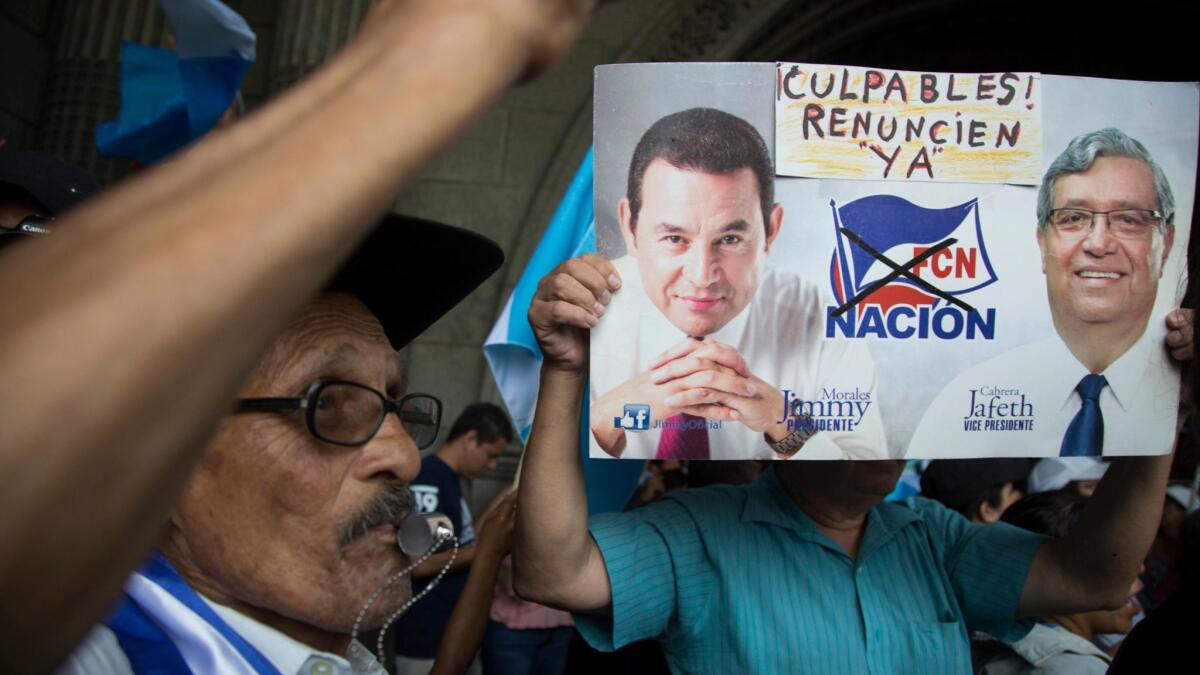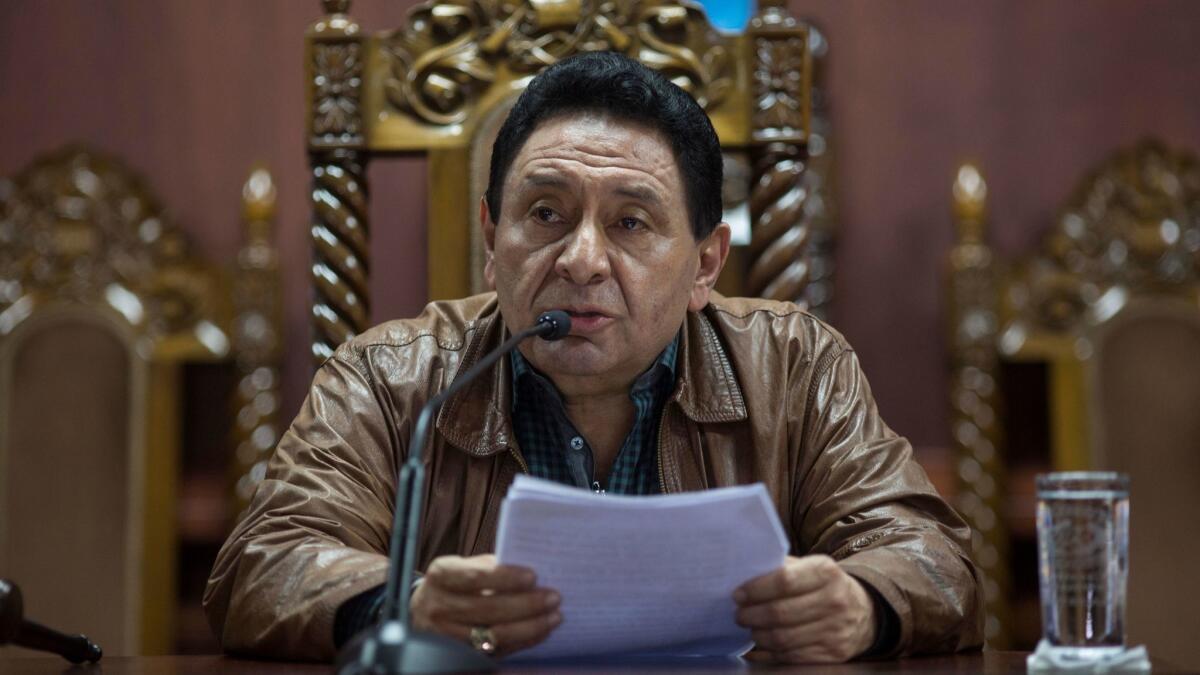Guatemalan president is foiled by court in effort to expel head of U.N. anti-corruption commission

- Share via
Reporting from Guatemala City — President Jimmy Morales announced Sunday that he was expelling the head of a U.N. anti-corruption commission that is investigating his campaign’s financing — only to have the order quickly blocked by Guatemala’s top court.
Morales’ move also drew criticism from the international community, including the United States, and at least two protests sprang up in the capital to decry the order.
A video posted on the government’s Twitter site early Sunday showed Morales declaring Ivan Velasquez “non grata” and ordering him to leave the country immediately. The president also announced he was firing Foreign Minister Carlos Raul Morales for failing to carry out the expulsion.
Morales said nothing of kicking out the entire commission of foreign experts, but the expulsion would leave its future unclear. The decade-old panel has worked with Guatemalan prosecutors to root out corruption and was key to bringing down former President Otto Perez Molina, who was forced to resign in 2015 and remains in prison.
Within hours, Francisco de Mata Vela, head of Guatemala’s Constitutional Court, said that body had issued a temporary injunction blocking the order to expel Velasquez. The court will now analyze the case before reaching a definitive decision. It was not clear how long that would take.

Morales released another video at midafternoon affirming his decision to boot Velasquez. He said Velasquez overstepped his authority by improperly pressuring the country’s legislative process and making public accusations against Guatemalans in spite of a presumption of innocence and guarantee of due process.
Chief prosecutor Thelma Aldana, working with the U.N. commission, announced Friday that she was asking the top court to recommend stripping Morales of his immunity from prosecution in order to investigate financing of his 2015 campaign, when he ran on the slogan, “Neither corrupt nor a crook.” If the court agrees, the decision on immunity would be made by Congress.
The prosecutor said Morales had refused to account for more than $800,000 in campaign financing and had hidden his own party’s accounts. Velasquez said at the joint news conference with Aldana that financing of some campaign expenditures could not be explained.
Morales has repeatedly denied any wrongdoing.
The embassies of international donor countries that support the U.N. commission — United States, Germany, Canada, Spain, France, Britain, Sweden and Switzerland as well as the European Union — issued a joint statement regretting Morales’ decision.
The commission “has played a vital role in the fight against impunity and corruption that undermine security and prosperity in Guatemala. The decision to expel Commissioner Ivan Velasquez harms the ability of [the commission] to achieve its mandate,” the statement said.
U.S. Rep. Eliot Engel, ranking member of the House Foreign Affairs Committee, expressed disappointment in Morales’ decision. In a statement, he said the U.S. government would examine the future of its foreign assistance to Guatemala.
Later Sunday, U.S. State Department spokeswoman Heather Nauert said in a statement that the U.S. was “deeply concerned” by Morales’ decision. She said Velasquez has been an effective leader of the commission and “it remains crucial that [the commission] be permitted to work free from interference by the Guatemalan government.”
Guatemala’s human rights prosecutor, Jordan Rodas, joined in one of the demonstrations at which people shouted support for Velasquez. He also spent time with Velasquez to guarantee his safety and said Velasquez stressed that he continued to lead the commission.
“The commissioner was doing well and is very appreciative of the support,” Rodas said.
Health Minister Lucrecia Hernandez Mack and her deputies resigned, saying that by expelling Velasquez, Morales had taken a position in favor of impunity and the corrupt sectors of the country.
The president’s action Sunday capped days of speculation that Morales would move against Velasquez. The president traveled to the U.N. last week to meet with U.N. Secretary-General Antonio Guterres and the government said topics included circumscribing the mandate of the anti-corruption commission led by Velasquez.
Mike Allison, a political science professor at the University of Scranton, said that by the time Morales arrived in New York, the international community had made clear Velasquez had its full backing. That left Morales in a difficult position of either waiting for the commission’s investigation to proceed and potentially force him from office or be proactive and push Velasquez out, Allison said.
Allison said the commission and the prosecutors and investigators it has helped train represent Guatemala’s best hope for a better future. “An attack upon them is an attack upon everyone in Guatemala who is fighting for a better country,” he said.
In May, a Guatemalan judge ordered that the brother and son of Morales stand trial on fraud charges. They are accused of submitting about $23,000 of false receipts in a tax fraud scheme in 2013, before Morales took office. Both have maintained their innocence.
Perez Molina resigned along with his vice president, Roxana Baldetti, in 2015 and both remain jailed awaiting trial on corruption charges related to a huge customs fraud scheme.
They have also been investigated on charges of bribery and money laundering stemming from a criminal graft network. Prosecutors alleged that Perez Molina received about $37.9 million from companies in return for awarding construction contracts. He also is accused of accepting a helicopter, a sports car, a plane and other gifts.
More to Read
Sign up for Essential California
The most important California stories and recommendations in your inbox every morning.
You may occasionally receive promotional content from the Los Angeles Times.













